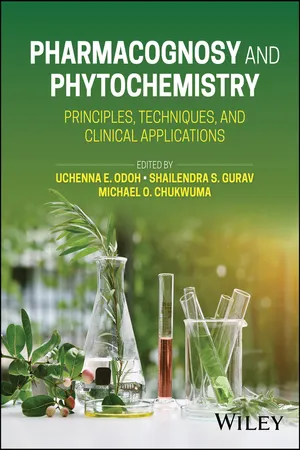
Pharmacognosy and Phytochemistry
Principles, Techniques, and Clinical Applications
- 495 pages
- English
- PDF
- Available on iOS & Android
Pharmacognosy and Phytochemistry
Principles, Techniques, and Clinical Applications
About this book
Key information on plant-based chemical and pharmacology research, from basics and principles through recent technological advances
Pharmacognosy and Phytochemistry provides an overview of the basics of pharmacognosy and phytochemistry from early principles through contemporary advances like molecular pharmacognosy. The book covers the classification of crude drugs, complementary and alternative medical (CAM) systems, adulteration and evaluation of drugs, extraction methods of plant drugs, and ethnobotany and ethnopharmacology.
The book also reviews the historical overview, therapeutic application, cultural and ecological dimensions of plant-based medicines. Other key chapters discuss biotechnology and clinical pharmacognosy.
Written by a group of expert contributors, Pharmacognosy and Phytochemistry reviews sample topics including:
- Methodologies for extracting bioactive compounds and techniques to perform qualitative and quantitative phytochemical analysis
- Therapeutic potential of plant secondary metabolites and the processes of isolation, purification, and characterization of herbal drugs
- Biological screening methods and biosynthetic pathways of phytopharmaceuticals, pharmaceutical aids, nutraceuticals, cosmeceuticals, pesticides, and allergens
- Comparative phytochemistry, chemotaxonomy, and the emerging field of marine pharmacognosy
Combining traditional knowledge with modern advancements to provide a holistic understanding of two important fields, Pharmacognosy and Phytochemistry serves as an excellent resource for students, researchers, and practitioners.
Frequently asked questions
- Essential is ideal for learners and professionals who enjoy exploring a wide range of subjects. Access the Essential Library with 800,000+ trusted titles and best-sellers across business, personal growth, and the humanities. Includes unlimited reading time and Standard Read Aloud voice.
- Complete: Perfect for advanced learners and researchers needing full, unrestricted access. Unlock 1.4M+ books across hundreds of subjects, including academic and specialized titles. The Complete Plan also includes advanced features like Premium Read Aloud and Research Assistant.
Please note we cannot support devices running on iOS 13 and Android 7 or earlier. Learn more about using the app.
Information
Table of contents
- Cover
- Half Title Page
- Title Page
- Copyright
- Contents
- List of Contributors
- Preface
- Chapter 1: Historical Overview of Pharmacognosy and Phytochemistry: Mona M. Marzouk, Mai M. Farid, Rana M. Merghany, Shahira M. Ezzat
- Chapter 2: Classification of Crude Drugs of Natural Origin: Vishal S. Bagul, Piyush S. Bafna, Deepak M. Patil, Rakesh E. Mutha
- Chapter 3: Folk Medicine as a Source of Therapeutically Important Drugs: Evidence from Ethnobotanical Investigations: Moses Sam Arul Raj, Mohan Kalaskar, Shailendra Gurav, Muniappan Ayyanar
- Chapter 4: Complementary and Alternative Medicinal Systems: Akshay M. Baheti, Arti G. Swami, Manasi R. Nimbalkar, Ranjit Nimbalkar, Anil T. Pawar
- Chapter 5: Cultivation, Collection, and Preparation of Plant Drugs: Mohan Kalaskar, Muniappan Ayyanar, Nilambari Gurav, Sanjay J. Surana
- Chapter 6: Adulteration and Evaluation of Crude Drugs of Natural Origin: Popat Mohite, Abhijeet Puri
- Chapter 7: Methods of Extraction: Mohan Kalaskar, Santosh U. Yele, Muniappan Ayyanar, Nilambari Gurav, Vishal Beldar, Sanjay J. Surana
- Chapter 8: Qualitative and Quantitative Methods of Phytochemical Analysis: Mughisha Nagori, Devyani Rajput, Gajendra Choudhary, Rakhi Khabiya
- Chapter 9: Modern Analytical Techniques for Quality Control and Chemical Identification of Phytochemicals: Rakesh E. Mutha, Mohan Kalaskar, Zamir G. Khan
- Chapter 10: Classification and Therapeutic Applications of Plant Secondary Metabolites: Amna Javed, Muhammad Saad Hashmi, Uzma Javaid, Rahima Amjad
- Chapter 11: Isolation, Fractionation, and Purification of Natural Products: Rushikesh P. Said, Jineetkumar B. Gawad, Mohan Kalaskar, Nilambari Gurav, Vishal Gokul Beldar
- Chapter 12: Pharmacological Screening of Drugs from Natural Sources: Jayesh D. Kadam, Adaeze L. Onugwu, Yogesh A. Kulkarni
- Chapter 13: Biosynthetic Pathways of Phytopharmaceuticals: Poonam Nilesh Chougule
- Chapter 14: Pharmaceutical Aids of Natural Origin: Santosh Yele, Ashwini Deshpande, Kanchan Salgar, Mohan Kalaskar
- Chapter 15: Nutraceuticals and Cosmeceuticals: Charulata T. Nemade, Nayana S. Baste, Manisha M. Bihani, Shilpa S. Raut
- Chapter 16: Pesticides and Allergens: Shatabdi Ghose, Bedanta Bhattacharjee, Damanbhalang Rynjah, Damiki Laloo
- Chapter 17: Comparative Phytochemistry and Chemotaxonomy: Prathamesh A. Marne, Anil T. Pawar, Amol A. Tagalpallewar, Akshay M. Baheti
- Chapter 18: Medicinal Plant Biotechnology: Anil T. Pawar, Amol A. Tagalpallewar, Manasi Mishra, Arti G. Swami, Akshay M. Baheti
- Chapter 19: Marine Pharmacognosy: Mamta Kumari, Piyushkumar Sadhu, Niyati Shah, Chitrali Talele
- Chapter 20: Molecular Pharmacognosy: Piyushkumar Sadhu, Mamta Kumari, Ghanshyam Parmar, Chitrali Talele
- Chapter 21: Clinical Pharmacognosy: Jayesh D. Kadam, Sandip T. Auti
- Index
- EULA